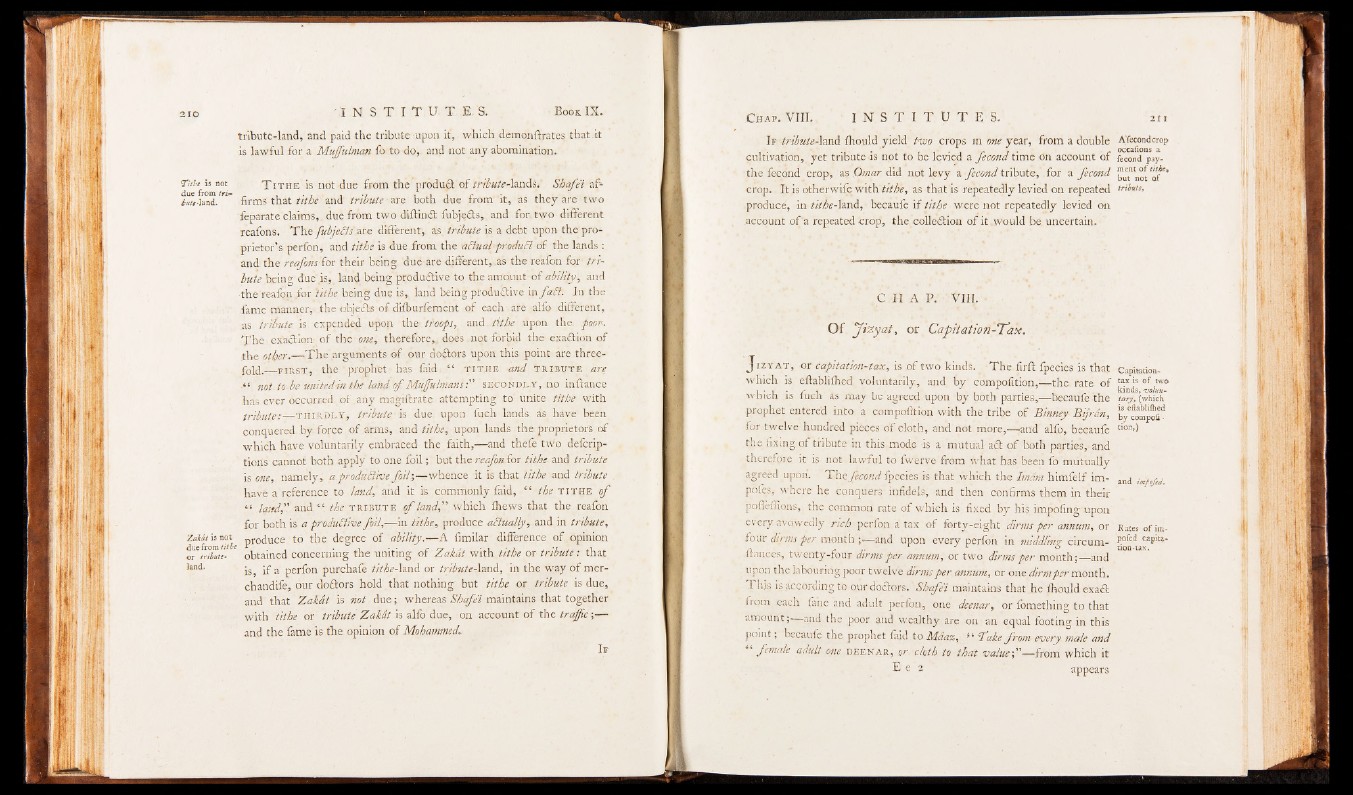
tribute-land, and paid the tribute upon it,, which demonftrates that.it
is lawful for a Muffulman fo to do,, and not any abomination.
Tithe is not
due from trilute
land.
Zakât is not
due from tithe
or tribute-
land.
T i t h e is not due from the product of tribute-\an&s. Shafe'i affirms
that tithe ' and tribute are both due from it, as they are two
feparate claims,, due from two diftindt fubjedts,. and for. two different
reafons. The fubjefts are different, as. tribute is a debt upon the pro^
prietor’s perfon, and tithe is due from the ablualprodubl of the lands:.
and. the reafons for their being due are different,,as the reafon for tribute
being due is, land being’ productive to the amount of ability, and
the reafon,for 'tithe being due is, land being productive in faSt, In the
fame manner-, the objedts of difburfement of each are alfo different,
.as tribute is,:expended upon the troops, and. tithe .upon the. poor.
T h e ; exaction of the one, therefore,; does . not forbid the- exadtion of
the other.— T h e arguments of our dodtors upon this point are threefold.—
first, the prophet has laid “ tithe and tribute are
.“ not.to.be uni ted in the land <f Muffulmans" secondly, no inftance
has ever occurred of any magiftrate attempting to unite tithe with
tribute-.— thirdly, tribute is due upon fuch lands as have been
conquered by force- of arms, and tithe, upon lands the. proprietors of
which have voluntarily embraced the faith,— and thefe twTo defcrip-
tioris cannot both apply to.one foil; but the reafon for tithe and tribute
is one, namely, a.produBive foil-,— whence it is that tithe and tribute
havé a reference to land, and it is commonly faid, “ the tithe o f
“ land,” and “ . the tribute o f land," .which fhews that the reafon
for both is a productive foil,-—in tithe,, produce abiually, and in tribute,
produce to the degree of ability.-^A fimilar difference of. opinion
obtained concerning the uniting of Zakat with tithe or tribute: that
is, if a perfon purchafe tithe-land or tribute-land, in the way of mer-
chandife, our dodtors hold that nothing' but tithe or tribute is due,
and that Zakat is not due;. whereas Shafe'i maintains that together
with tithe or tribute Zakat is alfo due, on account of the traffic;—
and the fame is the opinion of Mohammed.I .
If
If tribute-land fhould yield two crops in one year, from a double
cultivation, yet tribute -is not to be levied a fecond time On account of
the fecond crop, as Omar did not levy a-fecond tribute, for a fecond
crop. It is otherwife with tithe, as that'is repeatedly levied on repeated
product, in tithe-land, becaufe if tithe were not repeatedly levied on
account of a repeated crop, the colledtion of it.would be uncertain.
C II A P. VIII.
Of Jizyat, or Capitation-Tax.
J izyat, or capitation-tax, is of two kinds. The firft fpecies fs-that
which is eftablifhed voluntarily, and by compofition,— the rate of
which is fuch as may be agreed upon by both parties,— becaufe-the
-prophet entered into a compofition with the tribe of Binney Bij'ran,
for twelve hundred pieces of cloth, and not more,— -and alfo, becaufe
the fixing of tribute in this mode -is a mutual act of both parties,- and
therefore it is not lawful to fwerve from what has been fo mutually
agreed upon. The fecond fpecies is that which the Imam himfelf im-
poles, where he conquers infidels, and then confirms them in their
poflefiions, the common rate of which is fixed by his impofing upon
every avowedly rich perfon a tax of forty-eight dirms per annum, or
four dsrms per month —and upon every perfon in middling circum-
fiances, twenty-four dirms per annum, or two dirms per month;— and
upon the labouring poor twelve dirms per annum, or one dirmper month.
This is according to our dodtors. Shafe'i maintains that he fhould exadt
fiom each fane and adult perfon, one deenar, or fomethihg to that
amount; and the poor and wealthy are on an equal footing in this
point, becaufe the prophet faid to Maaz, ‘ 4 Bake from every male and
female adult one deenar, or cloth to that value-,"— from which it
E e 2 appears
A'fecondcrop
occafions a
fecond payment
o f tithe,
but not of
tribute,
Capitation-
tax is of two
kinds, 'voluntary,
(which
is eftablilhed
by compofi •
tion7)
and imfofed.
Kates of im-
pofed capitation
>tax.